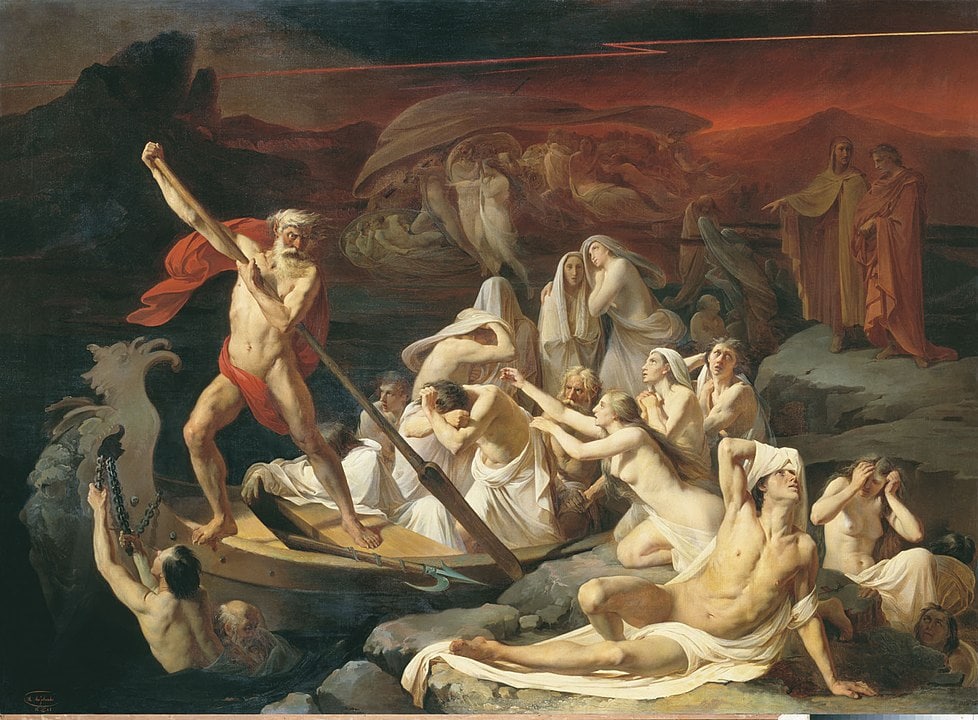
Table of Contents
In Greek mythology, the deity Styx played a central role in the War of Titans and was so highly respected by both mortals and gods that their unbreakable oaths were sworn upon her. The River Styx, named after her, was a massive river that encircled the underworld and had to be crossed by all souls on their way to Hades.
Here’s a closer look at the Styx and why it’s important in Greek mythology.
Styx the Goddess
Who was Styx?
Styx was the daughter of Tethys and Oceanus, the gods of freshwater. This union made Styx one of their three thousand offspring known as the Oceanids. In fact, she was the eldest.
Styx was the wife of the Titan Pallas, and together they had four children: Nike, Kratos, Zelus, and Bia. Styx lived in a cave in the underworld near her stream, which came from the great Oceanus.
Besides being the goddess of oaths and her river, Styx was the personification of hatred on earth. The name styx means shuddering or the hatred of death.
Styx in the War of Titans
According to the myths, the goddess Styx, under her Father’s advice, was the first immortal being to offer her children to Zeus’ cause, when he rose against his father Cronus:
- Nike, who represented victory
- Zelus, who represented rivalry
- Bia, who represented force
- Kratos, who represented strength
With the help of Styx and the grace of her children, Zeus and the Olympians would become victorious in the war. For this, Zeus would honor her, allowing her children to live forever by his side. Styx was so highly respected by Zeus that he proclaimed that all oaths should be sworn upon her. In keeping with this declaration, Zeus and others swore upon Styx and kept to their word, sometimes with devastating and destructive results.
Styx the River

The Five Rivers of the Underworld
While the River Styx is considered the main river of the underworld, there are others. In Greek myth, the underworld was surrounded by five rivers. These include:
- Acheron – river of woe
- Cocytus – river of lamentation
- Phlegethon – river of fire
- Lethe – river of forgetfulness
- Styx – river of unbreakable oath
The River Styx was said to be a great black river that bordered the point where the earth and the underworld were connected. The only way to cross the Styx and enter the underworld was via a ferryboat rowed by the fearsome boatman, Charon.
Myths of the River Styx
The water of the Styx had mystical properties, and in some accounts, it was corrosive to any ship that would try to sail in it. According to a Roman legend, Alexander the Great was poisoned with water from the Styx.
One of the most famous myths about the river is related to Achilles, the great Greek hero. Because Achilles was mortal, his mother wanted to make him strong and invincible, so she submerged him in the River Styx. This made him powerful and able to resist injury, but unfortunately, because she held him by his heel, that part of his body remained vulnerable.
This would be his undoing, and his greatest weakness, as in the end, Achilles died from an arrow to his heel. This is why we call any weak point an Achilles heel.
Is the Styx a Real River?
There is some debate that the River Styx was inspired by a real river in Greece. In the past, it was thought to be a river that ran near Feneos, an ancient Greek village.
Some believe that the Alpheus River in Italy is the actual River Styx and view it as a potential entrance to the underworld.
Another possible option is the Mavronéri, meaning black water, identified by Hesiod as the River Styx. This stream was believed to be poisonous. Some scientists have suggested that the waters of the Mavronéri may have been used to poison Alexander the Great in 323 BCE. It’s possible the river contained some form of bacteria that was poisonous to humans.
In Brief
For her involvement in the war of titans and for her river, Styx is deeply entangled in the affairs of Greek mythology. Her name was ever-present in the oaths of gods and mortals, and for this, she appears in a myriad of Greek tragedies. Styx gave the world one of its greatest heroes, Achilles, which makes her also a notable figure in the culture.








